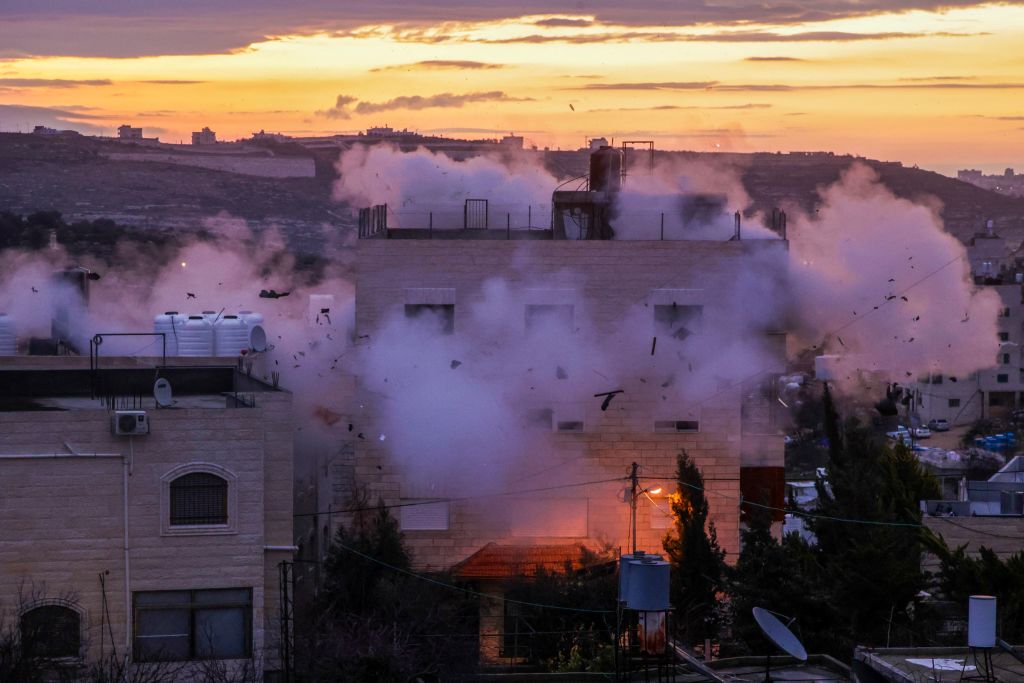Prospects for Israeli–Palestinian peace more remote than ever

A massive double crisis is emerging between the Jordan River and the Mediterranean. Both Israel and the Palestinian Authority are confronting internal challenges that have cast shadows over their futures, and fast-rising tensions between the two sides are approaching a breaking point.
In Israel, Benjamin Netanyahu has returned to power by allying himself with extreme ultra-Orthodox and right-wing parties that are determined to change the very nature of Israel’s constitutional order. Among other things, the government is pursuing reforms that will politicise the judiciary and strip it of its most important powers, as well as threatening to eliminate any remaining possibility of achieving a sustainable two-state solution to the Israeli–Palestinian question.
Meanwhile, Israelis have taken to the streets en masse to protest the government’s proposals. In a recent speech unveiling his own ‘people’s directive’ to end the crisis, Israeli President Isaac Herzog warned that the risk of a civil war cannot be dismissed. Within minutes of the proposal being released, Netanyahu’s government had already rejected it. Barring some miracle, Israel will continue to descend into the deepest domestic political crisis since its founding. The nature of the Israeli state that will emerge from this crucible is now an open question.
Gone are the days of the Oslo Accords, which offered hope of a resolution to the Israeli–Palestinian conflict by establishing structures and pathways for achieving a two-state solution. Fundamentalist forces on both sides have challenged this process from the very start, but never before have these forces been so powerful. The gradual downward slide that has been underway for many years is accelerating, erasing what was left of the legacy of Oslo. What remains today is little more than the rapidly crumbling ruins of what the accords once set up. Most Israelis no longer seem to care much about what’s happening in the occupied Palestinian territories, as long as their own security is assured.
On the other side of Israel’s high separation barrier walling off the West Bank, the Palestinian Authority is also spiralling into a crisis of legitimacy—albeit one that is perhaps less immediate than on the Israeli side. Recent polls show that a large majority of Palestinians have lost faith in the PA and favour abolishing it. PA President Mahmoud Abbas’s government has delivered neither peace nor prosperity. As Palestinians watch Israeli illegal settlements encroach on their lands while they suffer the daily humiliations of the occupation regime, they seem increasingly ready to give their support to those who want to take up arms.
These trends on both sides threaten to create a vicious cycle of violence and conflict that will be far worse than the occasional, explosive flare-ups over Gaza (which, sadly, have become more or less routine).
Making matters worse, at the level of international diplomacy, there’s a palpable fatigue about the so-called Middle East peace process. Many Arab countries have understandably moved on, even developing their own political and economic relations with Israel. With Russia bombarding Ukrainian civilians, the European Union is otherwise occupied—and even if it didn’t have a war on its borders, it is less internally united on the Israeli–Palestinian conflict than in the past.
Likewise, even though US President Joe Biden’s administration still voices support for a two-state solution, it hasn’t reversed any of the dangerous and illegal steps that Donald Trump’s administration took when it was cosying up to Netanyahu and further unravelling the conditions for making a two-state solution possible. It’s not difficult to understand why more Palestinians have succumbed to despair.
As we enter the season of Ramadan (March 22 – April 20) and Passover (April 5–13), passions are bound to rise even further. At least 100 people have already been killed in various West Bank clashes so far this year, and civilians on both sides have fallen victim to terrorist attacks. Pretty much everyone expects the situation to go from bad to worse in the weeks and months ahead.
The days of Oslo are long gone. The prospects for peace will not be revived without a fundamental reordering of the issues in one direction or the other. The big question, then, is whether international diplomacy, dormant for years, can be revived. If not, the most likely outcome will be another eruption of major violence and possibly a prolonged war.